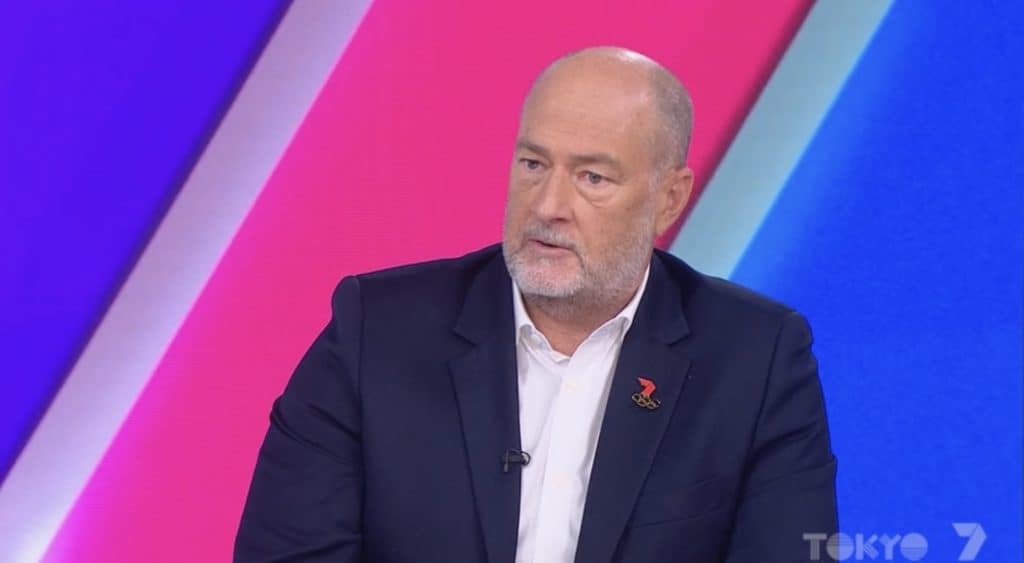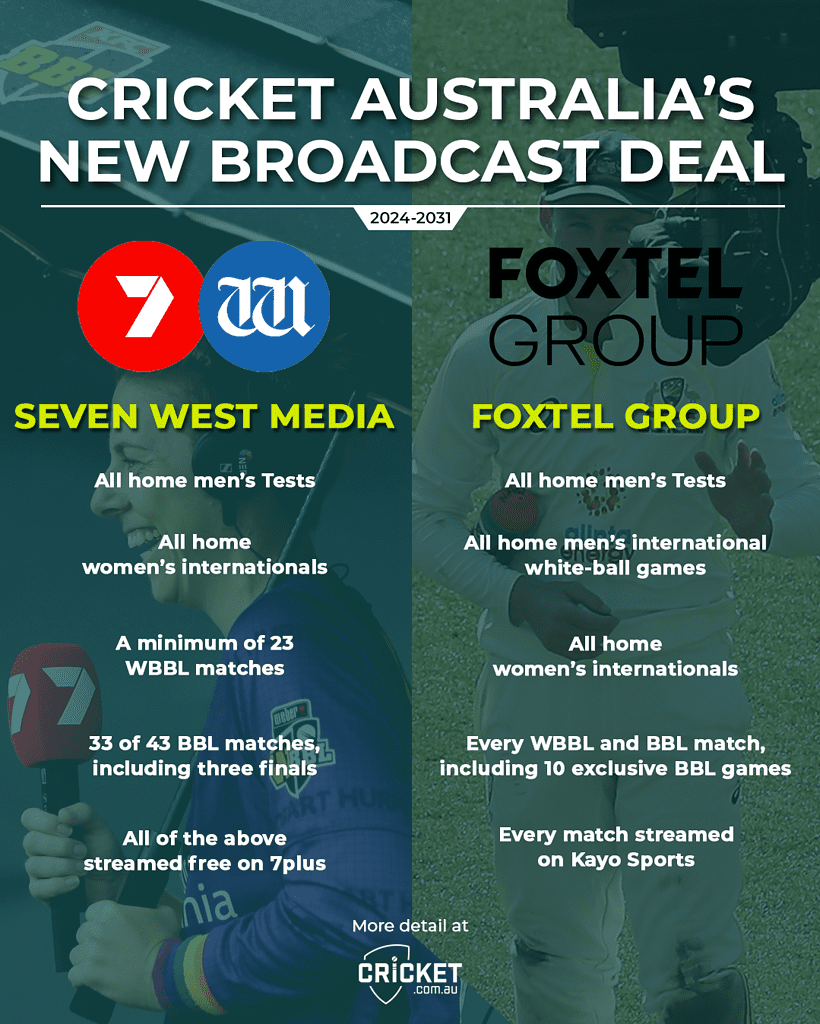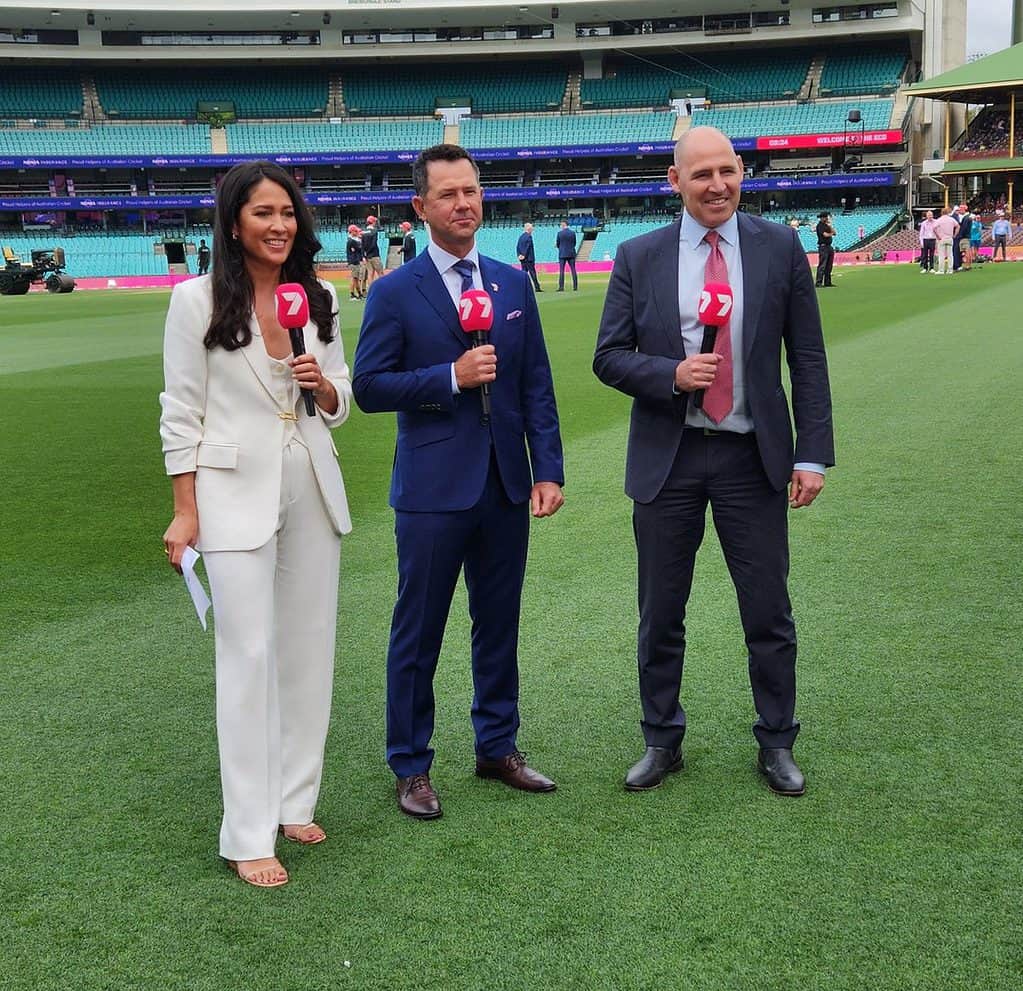The banner headline delivered by Seven head of sport Lewis Martin as the broadcaster confirmed it had retained the cricket rights and ending the cricket war was ‘Peace breaks out’.
Just how did Seven West Media manoeuvre itself from someone facing off against Australia’s biggest truly national sport in the court to be a cosy bedfellow?
Not only that, but the new love in between the warring factions also sees Seven paying less and getting more.
How much was it Seven’s strategy and how much was good fortune?
The strategy saw Seven downplaying its interest, or “trashing cricket” as some have called it. Then just when many thought it was out of the game, Seven returned to the crease and negotiated itself a winning proposition. Similar perhaps to a canny real estate investor who leads the agent and other interested parties to believe it is not a buyer, only to turn up on auction day with a swagger and just enough of a bankroll to secure the spoils.
The good fortune perhaps was Paramount’s insistence it wanted all or nothing. There is speculation that at one stage both Cricket Australia and Foxtel wanted Paramount FTA brand 10 as a partner. But with an eyer to the future, the global broadcaster wanted to involve its subscription platform Paramount+ which it saw as central to getting a return on investment.
There can be no doubting that Seven was initially certainly not interested in the BBL. As CEO James Warburton told Mediaweek’s Trent Thomas recently: “We’re in negotiations at the moment and have been pretty clear that we are keen to pursue the Tests but not the BBL.”
Warburton has a proven record of backing off when the sums don’t add up. Speaking about IOC negotiations in the past, he told Mediaweek: “All the reports that we will go and blow our brains out again [with a big rights bid] are wrong. It’s not going to happen.” That’s exactly what happened when Nine paid what Seven thought was too much for the next three Olympic cycles. Warburton and Martin though found a way through with the cricket though.
Mediaweek spoke with Seven’s Lewis Martin this week about the “cricket war”, sports rights and Seven’s pitch to audiences and advertisers.
Seven ends cricket war
When asked if Seven at any stage wanted to abandon the summer sport completely, Martin said: “What we have always been interested in is 52 weeks of the year. We have always wanted a 52-week proposition across a premier winter sport and across a premier summer sport. The combination of what that would be in summer was in discussion.
“We were working with Cricket Australia.” Martin noted both sides were prepared to bend. “You will see from the agreement that they have listened, and we have listened to them. We were always going to be the right fit for them. Cricket continues to be our focus in summer.
“Our network is about promotion, reach and growth for all of our sports. Our relationship has been tested, nothing was left unsaid. But the relationship James [Warburton] and I have with cricket now is as strong as we have with any other of our sports right now.
“The challenges of the past couple of years have probably made us stronger.”

Seven’s Lewis Martin
Seven’s new deal
As Seven noted in its cricket statement this week, it paid less and got more for this cycle of the rights. “Our linear and digital offering is now live and free for all Australians and everybody is welcome. People can continue to see Australia’s premier winter sport and Australia’s premier summer sport by streaming it or watching it on linear. This is a very exciting time for our business.”

T20 changes
Although the cricket war may be over, Seven continues to push for better scheduling, allowing Test cricketers to play in the domestic Big Bash League T20 competition. “We are very clear we want the biggest names playing and so do the fans. We only want what the audience wants. People say we are all about ratings. All ratings are is an indication of people watching. We just want more people to watch the sport – both in packed stadiums and watching via Seven and 7plus.
Sharing the dollars
A key new ingredient in Seven’s Cricket Australia contract is to give the sporting body a revenue share. “We both share the upside,” Martin explained about sending some of the ad revenue to Cricket Australia.
“That is why we are mutually motivated. It is credit to Nick [Hockley – Cricket Australia CEO] for adopting that. When we write a distribution cheque on a revenue share it is a good cheque to write.”
Martin said this isn’t the first time Seven has shared revenue with a content provider. “We have several revenue share agreements and payments are being made. When this model is used everybody is aligned on an outcome and everybody works harder for the growth of their sport.
“I’d like to see more revenue share models in play where sporting bodies back themselves for the upside.”
How Seven got selected
As noted in our introduction, Seven was not necessarily the original preferred FTA partner for Cricket Australia and Foxtel. What changed to end Seven’s cricket war?
“These sort of negotiations are always complex,” said Martin by way of an answer. “We always felt we were the right partner for the cricket by the way we are dedicated to it over summer. I don’t want to talk about other networks and their shortcomings or their strengths.
“One of our strengths is our cross-promotional capacity through our news services. Also the strength of promotion on our 7plus offering.” Martin also repeated, “And in summer, all we care about is cricket.”
Having history as a partner with Foxtel on the AFL maybe helped a little too? “We all know one another through a lot of experience. We work with them across both AFL and Supercars. We are very different, but we recognise and understand those differences.”

Seven’s Mel McLaughlin and Ricky Ponting with Cricket Australia’s Nick Hockley
Securing cricket for 7plus
“It’s a gamechanger for our business,” said Martin about having every Seven BBL and WBBL match on its BVOD and streaming platform. It future proofs our business. We now have the premier winter and summer sports live and free on 7plus for all Australians. To have that locked and loaded sets a patch for our business for the next decade.”
Is sport a loss leader?
“This deal is far more workable than we had in the past,” Martin explained in answer to a question about making a profit form a major sport. “It gives us an opportunity to launch our programming and it complements our news services. It is critical to our brand to keep us the #1 FTA sports broadcaster. Our advertisers are looking for that continuity and it gives them a certainty of delivery.
“One of the great things about live sport is that it is going to rate. Not only to our advertisers and our viewers, we have also locked in certainty to our investors.”
Big red train
Former Seven chief executive David Leckie used to talk about Seven’s overall appeal to Australians likening it to a big red train. “That big red train steams on for 52 weeks of the year,” confirmed Martin. ‘To use that Leckie terminology, having 52 weeks of live sport is a fantastic proposition for our business.”
See also: Paramount overlooked for selection as incumbents again Cricket Australia broadcast partners
